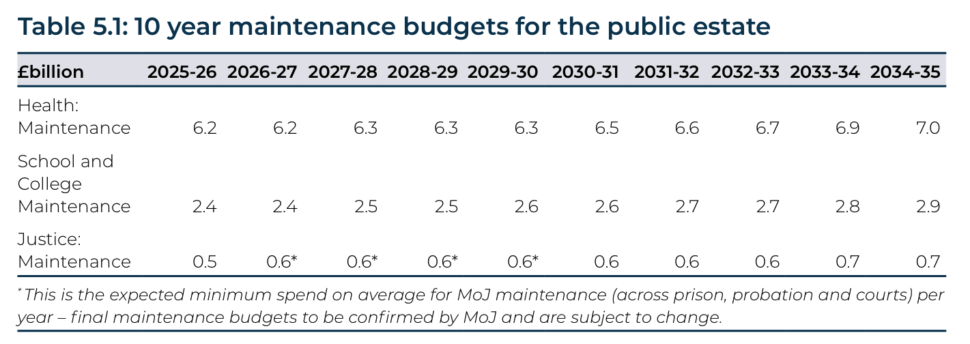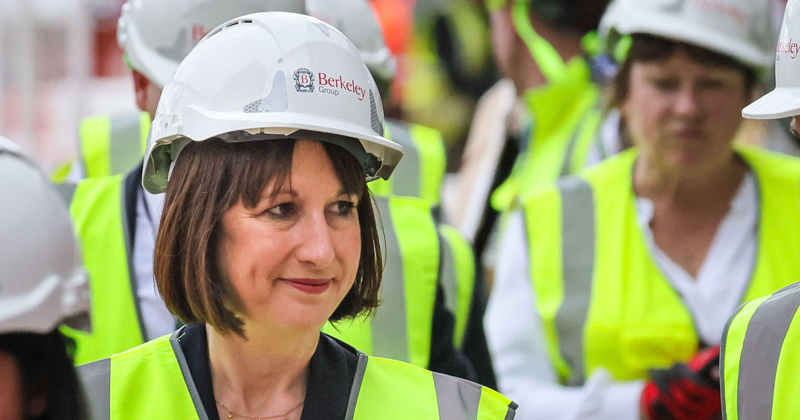Another 250 schools will join the government’s school rebuilding programme over the next decade, with £20 billion from ministers’ new 10-year infrastructure strategy earmarked for rebuilds.
The Treasury has also confirmed that the annual school and college maintenance budget will rise from £2.4 billion this year to £2.9 billion by 2034-35.
The document, published today, sets out how government will spend £725 billion on “economic and social infrastructure” over the next decade.
Chancellor Rachel Reeves announced at last week’s spending review that the school rebuilding programme would be ramped up, with spending increasing from £1.4 billion annually to around £2.4 billion per year over the next three years.
She also committed to expanding the programme, but documents did not state at the time how many additional schools would be covered.
£20bn for rebuilds, including existing programme
Today the Treasury has confirmed “almost £20 billion” will be spent on rebuilding between 2025 and 2035. Some of this would deliver projects at the more than 500 schools in the existing programme.
But funding will also enable “a further 250 schools to be selected within the next two years”.
The strategy also provides long-term commitments to raise annual school and college maintenance spending.
This will rise from £2.4 billion in 2025-26 to £2.9 billion by the end of the strategy period in 2034-35.

The current school rebuilding programme was announced by former prime minister Boris Johnson in 2020, and planned to spend around £1 billion a year on 500 projects over a decade.
But the Covid pandemic and ensuing cost of living crisis meant early projects took some time to get off the ground.
In recent years, however, the programme has ramped up with more projects breaking ground. In recent selection rounds schools with dangerous RAAC concrete have been prioritised. The number now approved stands at 518.
‘Stop-start’ funding lowered ‘market confidence’
In its strategy document today, the Treasury warned the “stop-start nature of funding for capital programmes over time lowered the market’s confidence and did not provide long-term certainty to maximise investment in the technology, training and skills needed to support delivery of projects.
“The government committed to continuing the SRP [beyond those already announced by the Conservatives] at the earliest opportunity, recognising the urgent condition need it inherited in the school estate fifteen years after the cancellation of the Building Schools for the Future programme.”
They said the SRP provided a “stable pipeline of standardised projects delivering buildings which are net carbon zero in operation, increasing resilience to climate change and reducing carbon emissions, energy use and operating costs.”
New construction frameworks and specs
The Treasury said the Department for Education was “currently procuring its next construction frameworks which will require contractors to deliver an even higher quality, better value and increased social value through requirements such as hiring apprentices to support the sector moving forward.
“Schools will be delivered to an updated output specification, building on what worked well. The programme delivers projects across England, providing learning environments which improve life chances for pupils and their communities, and supporting local workforces and SME.”
Reeves said infrastructure was “crucial to unlocking growth across the country, but for too long investment has been squeezed.
“Crumbling public buildings are a sign of the decay that has seeped into our everyday lives because of a total failure to plan and invest.
“We’re not just fixing buildings – we’re enhancing public services, improving lives and creating the conditions for sustainable economic growth in communities throughout the UK.”








Your thoughts